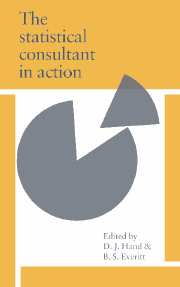Book contents
- Frontmatter
- Contents
- Preface
- List of contributors
- 1 Statistical consultancy
- 2 Consultants' cameos: a chapter of encounters
- 3 Straight consulting
- 4 A two-period crossover trial
- 5 Consultancy in a medical school, illustrated by a clinical trial for treatment of primary biliary cirrhosis
- 6 The analysis of response latencies
- 7 Acid rain and tree roots: an analysis of an experiment
- 8 On identifying yeasts and related problems
- 9 Uneven sex ratios in the light-brown apple moth: a problem in outlier allocation
- 10 Collaboration between university and industry
- 11 Inspection for faulty components before or after assembly of manufactured items
- 12 Statistical modelling of the EEC Labour Force Survey: a project history
- Bibliography on statistical consulting
- Name index
- Subject index
5 - Consultancy in a medical school, illustrated by a clinical trial for treatment of primary biliary cirrhosis
Published online by Cambridge University Press: 05 June 2012
- Frontmatter
- Contents
- Preface
- List of contributors
- 1 Statistical consultancy
- 2 Consultants' cameos: a chapter of encounters
- 3 Straight consulting
- 4 A two-period crossover trial
- 5 Consultancy in a medical school, illustrated by a clinical trial for treatment of primary biliary cirrhosis
- 6 The analysis of response latencies
- 7 Acid rain and tree roots: an analysis of an experiment
- 8 On identifying yeasts and related problems
- 9 Uneven sex ratios in the light-brown apple moth: a problem in outlier allocation
- 10 Collaboration between university and industry
- 11 Inspection for faulty components before or after assembly of manufactured items
- 12 Statistical modelling of the EEC Labour Force Survey: a project history
- Bibliography on statistical consulting
- Name index
- Subject index
Summary
The role of academic statisticians in a university medical school can be quite varied. In addition to teaching commitments, their research activities may be classified into three broad areas:
availability as a statistical consultant to advise and provide technical assistance for the statistical aspects of any worthwhile research projects;
to undertake more in-depth scientific collaboration on a limited number of research projects that contain a major statistical element; such projects will often be primarily motivated within the statistician's own department, but may sometimes arise from contacts outside the medical school;
to undertake methodological research in medical statistics to develop new approaches to the design and analysis of medical investigations.
The balance of time that each statistician devotes to these three areas will depend on the nature of their appointment, their own particular aptitudes, the opportunities that arise in each area and the general policy of the department and medical school in which they work.
In our case, the Department of Clinical Epidemiology and General Practice at the Royal Free Hospital School of Medicine in London has active research programmes in epidemiology and clinical trials so that the principal research effort is directed towards scientific collaboration and methodological research. This requires applied statisticians to expand their activities into non-statistical areas, by acquiring the necessary knowledge of the medical and epidemiological issues relating to the collaborative research. That is, statisticians have to become project-oriented whereby their efforts will be directed towards advancing medical knowledge.
- Type
- Chapter
- Information
- The Statistical Consultant in Action , pp. 58 - 71Publisher: Cambridge University PressPrint publication year: 1987



